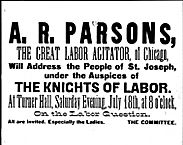| Entries |
| K |
|
Knights of Labor
|

|
Local workers began to lose faith in the effectiveness of the Knights of Labor after a smashing defeat of its packinghouse assemblies in fall 1886. The aftermath of the Haymarket Affair earlier that year and the ensuing government repression also stymied industrial organizing. To counter local government's antilabor bias, Chicago's labor activists looked toward electoral politics, and in 1887, under the leadership of the Knights, the United Labor Party won 31 percent of Chicago's mayoral vote, the highest percentage achieved by any labor party in the city's history. But political mobilization did not translate into a flourishing union movement. Of the 116 new assemblies established in 1886, 61 percent had lapsed by 1887 and 80 percent by 1888. Yet despite the swift decline of the Knights, their principles of labor solidarity and their practice of inclusiveness would inspire subsequent labor movements, both in Chicago and across the nation.
The Encyclopedia of Chicago © 2004 The Newberry Library. All Rights Reserved. Portions are copyrighted by other institutions and individuals. Additional information on copyright and permissions.